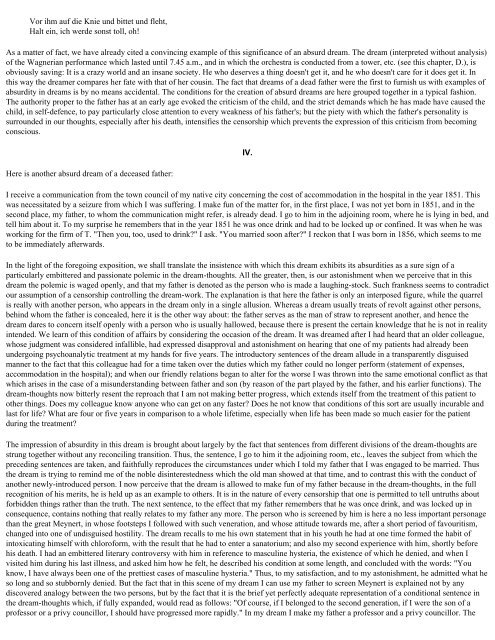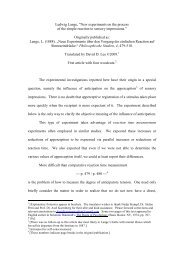The Interpretation Of Dreams Sigmund Freud (1900) PREFACE
The Interpretation Of Dreams Sigmund Freud (1900) PREFACE
The Interpretation Of Dreams Sigmund Freud (1900) PREFACE
Create successful ePaper yourself
Turn your PDF publications into a flip-book with our unique Google optimized e-Paper software.
Vor ihm auf die Knie und bittet und fleht,<br />
Halt ein, ich werde sonst toll, oh!<br />
As a matter of fact, we have already cited a convincing example of this significance of an absurd dream. <strong>The</strong> dream (interpreted without analysis)<br />
of the Wagnerian performance which lasted until 7.45 a.m., and in which the orchestra is conducted from a tower, etc. (see this chapter, D.), is<br />
obviously saving: It is a crazy world and an insane society. He who deserves a thing doesn't get it, and he who doesn't care for it does get it. In<br />
this way the dreamer compares her fate with that of her cousin. <strong>The</strong> fact that dreams of a dead father were the first to furnish us with examples of<br />
absurdity in dreams is by no means accidental. <strong>The</strong> conditions for the creation of absurd dreams are here grouped together in a typical fashion.<br />
<strong>The</strong> authority proper to the father has at an early age evoked the criticism of the child, and the strict demands which he has made have caused the<br />
child, in self-defence, to pay particularly close attention to every weakness of his father's; but the piety with which the father's personality is<br />
surrounded in our thoughts, especially after his death, intensifies the censorship which prevents the expression of this criticism from becoming<br />
conscious.<br />
Here is another absurd dream of a deceased father:<br />
IV.<br />
I receive a communication from the town council of my native city concerning the cost of accommodation in the hospital in the year 1851. This<br />
was necessitated by a seizure from which I was suffering. I make fun of the matter for, in the first place, I was not yet born in 1851, and in the<br />
second place, my father, to whom the communication might refer, is already dead. I go to him in the adjoining room, where he is lying in bed, and<br />
tell him about it. To my surprise he remembers that in the year 1851 he was once drink and had to be locked up or confined. It was when he was<br />
working for the firm of T. "<strong>The</strong>n you, too, used to drink?" I ask. "You married soon after?" I reckon that I was born in 1856, which seems to me<br />
to be immediately afterwards.<br />
In the light of the foregoing exposition, we shall translate the insistence with which this dream exhibits its absurdities as a sure sign of a<br />
particularly embittered and passionate polemic in the dream-thoughts. All the greater, then, is our astonishment when we perceive that in this<br />
dream the polemic is waged openly, and that my father is denoted as the person who is made a laughing-stock. Such frankness seems to contradict<br />
our assumption of a censorship controlling the dream-work. <strong>The</strong> explanation is that here the father is only an interposed figure, while the quarrel<br />
is really with another person, who appears in the dream only in a single allusion. Whereas a dream usually treats of revolt against other persons,<br />
behind whom the father is concealed, here it is the other way about: the father serves as the man of straw to represent another, and hence the<br />
dream dares to concern itself openly with a person who is usually hallowed, because there is present the certain knowledge that he is not in reality<br />
intended. We learn of this condition of affairs by considering the occasion of the dream. It was dreamed after I had heard that an older colleague,<br />
whose judgment was considered infallible, had expressed disapproval and astonishment on hearing that one of my patients had already been<br />
undergoing psychoanalytic treatment at my hands for five years. <strong>The</strong> introductory sentences of the dream allude in a transparently disguised<br />
manner to the fact that this colleague had for a time taken over the duties which my father could no longer perform (statement of expenses,<br />
accommodation in the hospital); and when our friendly relations began to alter for the worse I was thrown into the same emotional conflict as that<br />
which arises in the case of a misunderstanding between father and son (by reason of the part played by the father, and his earlier functions). <strong>The</strong><br />
dream-thoughts now bitterly resent the reproach that I am not making better progress, which extends itself from the treatment of this patient to<br />
other things. Does my colleague know anyone who can get on any faster? Does he not know that conditions of this sort are usually incurable and<br />
last for life? What are four or five years in comparison to a whole lifetime, especially when life has been made so much easier for the patient<br />
during the treatment?<br />
<strong>The</strong> impression of absurdity in this dream is brought about largely by the fact that sentences from different divisions of the dream-thoughts are<br />
strung together without any reconciling transition. Thus, the sentence, I go to him it the adjoining room, etc., leaves the subject from which the<br />
preceding sentences are taken, and faithfully reproduces the circumstances under which I told my father that I was engaged to be married. Thus<br />
the dream is trying to remind me of the noble disinterestedness which the old man showed at that time, and to contrast this with the conduct of<br />
another newly-introduced person. I now perceive that the dream is allowed to make fun of my father because in the dream-thoughts, in the full<br />
recognition of his merits, he is held up as an example to others. It is in the nature of every censorship that one is permitted to tell untruths about<br />
forbidden things rather than the truth. <strong>The</strong> next sentence, to the effect that my father remembers that he was once drink, and was locked up in<br />
consequence, contains nothing that really relates to my father any more. <strong>The</strong> person who is screened by him is here a no less important personage<br />
than the great Meynert, in whose footsteps I followed with such veneration, and whose attitude towards me, after a short period of favouritism,<br />
changed into one of undisguised hostility. <strong>The</strong> dream recalls to me his own statement that in his youth he had at one time formed the habit of<br />
intoxicating himself with chloroform, with the result that he had to enter a sanatorium; and also my second experience with him, shortly before<br />
his death. I had an embittered literary controversy with him in reference to masculine hysteria, the existence of which he denied, and when I<br />
visited him during his last illness, and asked him how he felt, he described his condition at some length, and concluded with the words: "You<br />
know, I have always been one of the prettiest cases of masculine hysteria." Thus, to my satisfaction, and to my astonishment, he admitted what he<br />
so long and so stubbornly denied. But the fact that in this scene of my dream I can use my father to screen Meynert is explained not by any<br />
discovered analogy between the two persons, but by the fact that it is the brief yet perfectly adequate representation of a conditional sentence in<br />
the dream-thoughts which, if fully expanded, would read as follows: "<strong>Of</strong> course, if I belonged to the second generation, if I were the son of a<br />
professor or a privy councillor, I should have progressed more rapidly." In my dream I make my father a professor and a privy councillor. <strong>The</strong>



